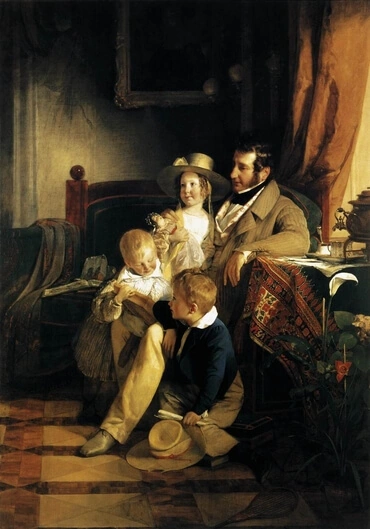Vater

Vater bedeutet im Wort das Innerste, und in den Dingen, die der Ordnung des Herrn folgen, bedeutet es das Gute. Im höchsten Sinne bedeutet Vater den Herrn selbst, den Schöpfer. Bei der Zeugung natürlicher Kinder ist es der Vater, der die Seele oder das innerste Gefäß des Lebens und eine innere Vererbung bereitstellt, und die Mutter, die die gesamte Substanz bereitstellt, aus der die Seele ihren Körper bildet, sowie eine äußere Vererbung. In diesem Prozess kommt die Seele vom Herrn durch den Vater, und nicht vom Vater, da alles Leben vom Herrn kommt.
Der weise Mensch nennt den Herrn seinen Vater und die Kirche seine Mutter, weil seine inneren Lieben vom Herrn kommen, aber durch die von der Kirche gelehrten Wahrheiten Form und Aktualität erhalten. Die so hervorgebrachten Dinge sind die geistigen "Kinder" eines Menschen.
Wenn im Neuen Testament von Jesus und dem Vater die Rede ist, ist damit die äußere Manifestation mit dem Göttlichen selbst als Seele im Inneren gemeint. Weil Jesus von einer natürlichen Mutter geboren wurde, hatte Er einen natürlichen Körper und eine natürliche jüdische Vererbung. Im Laufe seines Lebens, als er von den Höllen versucht wurde, legte er langsam alles ab, was er von seiner Mutter hatte, und ersetzte es durch das, was er von sich selbst im Inneren hatte, den Vater. Indem Er das tat, machte Er sich selbst eins mit dem Vater, der Sein Innerstes war, so dass Er wirklich sagen konnte: "Ich und mein Vater sind eins".
(Reference: Enthüllte Offenbarung 170; Himmlischen Geheimnissen 1815, 3703 [4]; Die göttliche Vorsehung 330 [1,2]; Wahre Christliche Religion 103 [1,2])
Arcana Coelestia #3245
3245. 'Abraham gave all that he had to Isaac' in the highest sense means all the Divine things within the Divine Rational, and in the relative sense the celestial things of love imparted to the Lord's celestial kingdom. This is clear from the representation of 'Abraham' as the Lord as regards the Divine itself, dealt with already, and from the representation of 'Isaac' as the Lord as regards the Divine Rational, also dealt with already. Now because in the internal sense the Lord is represented by both Abraham and Isaac, and the Lord made His Rational Divine from His own Divine, 'Abraham gave all that he had to Isaac' therefore means all the Divine things within the Divine Rational. All that precedes and follows has regard to this, that is to say, to the consideration that everything in the Lord's Rational was made Divine. Indeed in the places where Abraham, Isaac, and Jacob are the subject, the Lord's Human, how it was made Divine, is dealt with in the internal sense.
[2] There are two components which strictly speaking make up the human - the rational and the natural. The Lord's Rational is represented by 'Isaac', but His Natural by 'Jacob'. The Lord made both of these Divine. How He made the Rational Divine is contained in what is stated regarding Isaac, but how He made the Natural so in what is stated later on regarding Jacob. But the latter - the Natural - could not be made Divine before the Rational was made Divine, for it was by means of the Rational that the Natural became Divine. This explains why the words that are being explained here mean all the Divine things within the Divine Rational.
[3] Furthermore every single detail which in the internal sense has reference to the Lord also has reference to His kingdom and Church, the reason being that the Lord's Divine constitutes His kingdom. Consequently when the Lord is the subject so also is His kingdom the subject; see 1965. However when the internal sense has reference to the Lord it is the highest sense, but when it has reference to His kingdom it is the relative sense. The relative sense of these words - 'Abraham gave all to Isaac' - is that the celestial things of love were imparted to the Lord's celestial kingdom. Indeed in the relative sense 'Isaac' means the celestial kingdom, for the rest of Abraham's sons, that is to say, those he had by Keturah, mean the Lord's spiritual kingdom, as shown above, as also does Ishmael, who is dealt with below.






